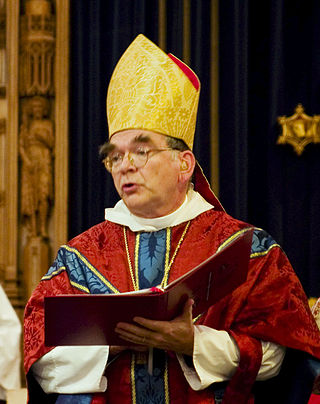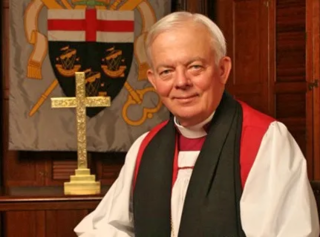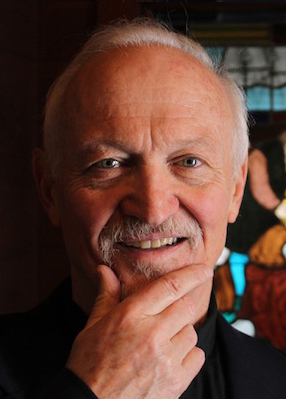The General Theological Seminary of the Episcopal Church (GTS) is an Episcopal seminary in New York City. Founded in 1817, GTS is the oldest seminary of the Episcopal Church and the longest continuously operating seminary in the Anglican Communion. The seminary was chartered by an act of the Episcopal Church's General Convention and its name was chosen to reflect its founders' vision that it be a seminary to serve the whole Church. In 2022, the General Theological Seminary entered into a formal affiliation with Virginia Theological Seminary whereby the two separate institutions share a common leadership structure.
Charles Ellsworth Bennison Jr. is an American bishop. He was the 15th bishop of the Episcopal Diocese of Pennsylvania.

Trinity Anglican Seminary, formerly known as Trinity Episcopal School for Ministry, is an Anglican seminary in Ambridge, Pennsylvania. It is generally associated with evangelical Anglicanism.

Robert William Duncan is an American Anglican bishop. He was the first primate and archbishop of the Anglican Church in North America (ACNA) from June 2009 to June 2014. In 1997, he was elected bishop of the Episcopal Diocese of Pittsburgh. In 2008, a majority of the diocesan convention voted to leave the diocese and the Episcopal Church and, in October 2009, named their new church the Anglican Diocese of Pittsburgh. Duncan served as bishop for the new Anglican diocese until 10 September 2016 upon the installation of his successor, Jim Hobby.

The Episcopal Diocese of Pittsburgh is a diocese in the Episcopal Church in the United States of America. Geographically, it encompasses 11 counties in Western Pennsylvania. It was formed in 1865 by dividing the Episcopal Diocese of Pennsylvania. The diocesan cathedral is Trinity Cathedral in downtown Pittsburgh. The Rt. Rev. Ketlen A. Solak was consecrated and seated as its current bishop in autumn 2021.

The Episcopal Diocese of the Rio Grande is the Episcopal Church's diocese in New Mexico and southwest Texas, the portion of the state west of the Pecos River, including the counties of El Paso, Reeves, Culberson, Jeff Davis, Brewster, Presidio, Terrell, Hudspeth and Pecos. The total area of the diocese is 153,394 square miles (397,290 km2). According to the 2006 parochial report, there are 57 active congregations within the diocese. The see is based in Albuquerque, New Mexico and the diocesan cathedral is the Cathedral Church of St. John.
Peter Robert Coffin was the eighth Anglican Bishop of Ottawa, from 1999 to 2007. He also served as the Anglican Bishop Ordinary to the Canadian Forces from 2004 to 2016.

Trinity Cathedral is an Episcopal Church in downtown Pittsburgh, Pennsylvania and is the cathedral for the Episcopal Diocese of Pittsburgh.
The Anglican Diocese of Pittsburgh is a diocese of the Anglican Church in North America. It has parishes in the several counties of Western Pennsylvania. In addition, the diocese has oversight of several parishes that are not located within its geographical boundaries, including three in Illinois, two in Tennessee, and one in Colorado. The diocese also has a parish in Mexico.
Keith Lynn Ackerman is an American Anglican bishop. Consecrated as a bishop for the Diocese of Quincy in the Episcopal Church, he is currently bishop vicar of the Anglican Diocese of Quincy of the Anglican Church in North America and assisting bishop of the Diocese of Fort Worth.
Albert Arthur Chambers was the seventh bishop of the Episcopal Diocese of Springfield, serving from 1962 to 1972. He then retired in part because he opposed revising the Book of Common Prayer and ordaining women as priests, which would be expressly authorized by the General Convention in 1976.

Peter James Lee was an American bishop of the Episcopal Church.
William S. Thomas Jr. was suffragan bishop of the Episcopal Diocese of Pittsburgh, serving from 1953 to 1971.

Wilburn Camrock Campbell became the fourth Bishop of West Virginia in the Episcopal Church in the United States, after working with Bishop Robert E.L. Strider as coadjutor for five years.
James Lafayette Hobby Jr. is a former American bishop of the Anglican Church in North America. He was elected the second bishop of the Anglican Diocese of Pittsburgh on 23 April 2016 and enthroned on 10 September 2016. He is married to Shari, also an Anglican priest, and they have three daughters.

David John Bird is dean emeritus of the historic Trinity Episcopal Cathedral, the oldest church structure in continuous use in San Jose. He is a parish priest who reads and writes poetry and is particularly fond of Alfred Lord Tennyson. As a theologian, he emphasizes a liberal, compassionate, and inclusive approach and is devoted to ecumenism. Bird promotes Christian unity and is published in this field; since 2002, he has served on the national Committee of The Episcopal Church-United Methodist Church Dialogue.

David Lee Hicks is an American Anglican bishop. He was bishop coadjutor in the Diocese of the Northeast and Mid-Atlantic of the Reformed Episcopal Church, from 2005 to 2008 and served as bishop ordinary from 2008 to 2019. He had been also a bishop of the Anglican Church in North America, since the Reformed Episcopal Church was one of the founding bodies that joined at its inception, beginning in 2009. He also served as president and chancellor of the Reformed Episcopal Seminary as well as on various committees.
John Clark Buchanan was an American bishop. He was the sixth bishop of the Episcopal Diocese of West Missouri.
Kenneth Lester Price Jr. is an American prelate of the Episcopal Church, who served as Suffragan Bishop of Southern Ohio between 1994 and 2012, and Provisional Bishop of Pittsburgh between 2009 and 2012. Since 2015, he has served as Assistant Bishop of Southern Ohio.
John Hewitt Rodgers Jr. (1930–2022) was an American Anglican theologian and bishop. The author of multiple commentaries on the Thirty-Nine Articles of Religion, he was a founding faculty member at Trinity School for Ministry and served as its dean and president from 1978 to 1990. In 2000, he played a role in the global Anglican realignment when he was consecrated as a bishop of the Anglican Church of Rwanda to oversee congregations in North America through the Anglican Mission in America.










